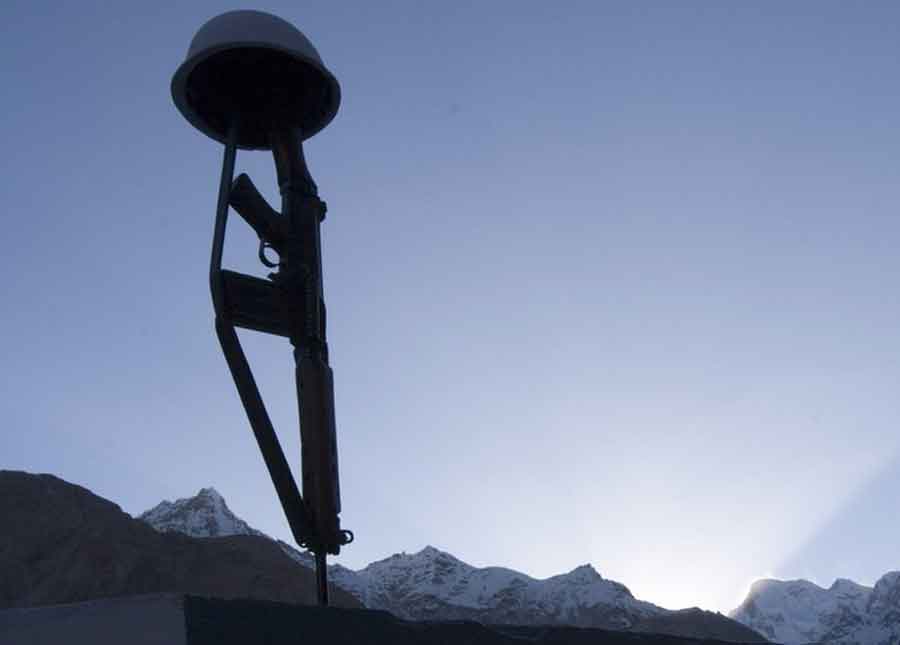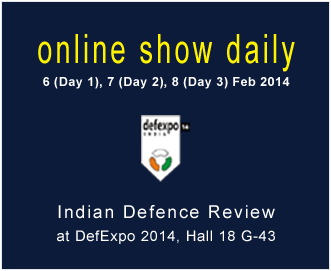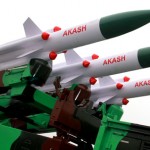IDR Blog
The Forgotten Jawan
The army counts for little on the electoral battlefield
On the eve of yet another general election, it is but natural for observers to crystal-gaze into what the future portends by looking towards those strategizing in political war-rooms towards formulating party battle-lines. Post-elections, both in 2004 and 2009, one had reflected in these columns on the hopes and expectations that the winners of those elections had aroused in the minds of those of our uniformed sons and daughters who, through thick and thin, continue to put their lives on line to keep our nation-state secure. With the benefit of hindsight, one rues the optimism then reflected. Far from expectations being addressed, even promises remain unfulfilled. The inevitable conclusion is that national security, except in times of full-blown crises, is so taken for granted by the people that it does not stir the political conscience to become either an electoral issue or one of delivering change. The armed forces and the veterans, not being vote-banks, count for little on the electoral battlefield and hence do not merit even minimal political capital. Paying lip service in the form of homilies from the ramparts of Red Fort or other ceremonial occasions is capital enough to keep the cockles of our uniformed fraternity warm.
The armed forces and the veterans, not being vote-banks, count for little on the electoral battlefield and hence do not merit even minimal political capital.
Personal belief that this prescription may have outlived its utility makes this writer reflect on some of the issues that our political war-room strategists would do well to ponder while formulating battle plans for 2014. Four broad areas of direct concern to the armed forces, from which flow many other weaknesses, are hence worth flagging.
The first, and by far the most vital, is the total disconnect between the people represented by our lawmakers and national security — more specifically, as it relates to the armed forces of the republic. Since we never tire of claiming to being the largest democracy in the world, this disconnect does little credit to the substance of our democratic credentials. Can we, for example, recollect when our Parliament last invested time in a meaningful debate on an issue concerning the armed forces? When the nation was witness to the unholy spectacle of a serving chief taking his government to the Supreme Court, why was the legislature unmoved? When the issue of a soldier’s suicide was raised in Parliament, against the backdrop of an alarming increase in suicides in the armed forces (1,028 between 2008 and 2012, as earlier mentioned by the defence minister in Parliament), our legislators were silenced by the prime minister’s statement that it was a small incident being blown out of all proportion and not good for the morale of the armed forces. Which democracy would be silent witness to two of its soldiers’ bodies being mutilated by a hostile neighbour, with one head being taken away as trophy, and the Parliament not holding the minister of defence accountable and the government of the day answerable? Perhaps the indifference is best exemplified by contrasting the superficial pro forma debate that accompanies our defence budget to the oldest democracy where the budget is subject to item-wise scrutiny before being debated threadbare.
When thousands of veterans have been compelled to hold dharnas and rallies in just demand of their dues, and when an equal number have returned the medals earned through sweat and blood to the president who is their Supreme Commander, the conscience keepers of the nation have remained unmoved. If today the profession of arms does not feature in the wish list of our younger generation as amply reflected in the gross shortage of the officer cadre in each service, should not our legislators be clamouring for answers?
…the bureaucracy remains firmly in control, being arbiter of all major decisions, including procurements, promotions and high-level appointments, in spite of no domain expertise within it.
When lawmakers fail to exercise one of their primary functions of holding the executive accountable through oversight, the field is left wide open for the executive and its handmaiden, the bureaucracy, as the unchallenged masters of the national security-management landscape. This has resulted in the next challenge, that of the deeply frayed civil-military relationship, drip-fed and sustained out of the historical bogey that the military, if not kept in its place, may become too big for its boots. This archaic mindset results in India being the only democracy where the services’ headquarters remain outside of the ministry of defence, and hence not involved in policy-making even in areas where expertise resides solely with them. Efforts to bring about change after the Kargil Review Committee and subsequent group-of-ministers recommendations were hijacked through a bureaucratic sleight of hand when the nomenclature of service headquarters was changed from “attached offices” to “integrated headquarters” of the defence ministry. In essence, nothing of substance changed, unless printing of new letterheads qualifies for substantial progress!
Consequently, the bureaucracy remains firmly in control, being arbiter of all major decisions, including procurements, promotions and high-level appointments, in spite of no domain expertise within it. Proposals to post uniformed people within the MOD to provide professional expertise have not found favour. Another recent effort of the Naresh Chandra Committee still remains off the public domain, but, from all accounts, is destined to remain on paper, because status quo suits the system where authority and accountability remain divorced and where the armed forces have no option but to carry the can in dignified, though frustrated, silence.
This vice-like hold has had a debilitating effect at two levels. In the higher echelons of the armed forces, it breeds a culture where some senior officers are tempted to curry favours towards the betterment of their own interests and cultivating godfathers to feather their nests. Only the very naïve were surprised when some months ago reports appeared of succession plans of chiefs being drawn out and factors other than merit being the drivers. Keen observers of the armed forces will readily recall many such instances spreading across all the services. When merit and integrity are superseded they inevitably lead to mediocrity and greed.
The price for disappointing them may not affect the electoral outcome, but will certainly weaken national military resolve.
In a professional culture where leaders’ orders are treated as gospel even in the face of death and where the ethos is of a leader’s own interest coming last always and every time, this state of affairs is undermining the very fabric of our fighting forces at field levels. Alarm bells should have been ringing loud when a series of scams involving the highest echelons of the uniformed fraternity have surfaced with unfailing regularity along with cases of indiscipline in field formations with a rising level of suicides and other stress-related problems. But we remain sanguine.
The third aspect is best reflected by what was succinctly brought out by the Parliamentary Committee on Defence in 2001. The committee had taken a serious view of the practice repeatedly being followed, since Independence, of downgrading armed forces’ officers both in warrant of precedence and in their equivalence to their civilian counterparts, owing to which their honour and prestige in society had also greatly been affected. The committee was of the view that their conditions of service needed to be considered on their own merit without comparison to their civilian counterparts. Since the Pay Commissions have been the vehicles through which this systematic undermining has taken place, repeated appeals for a separate Pay Commission for the armed forces have been ignored steadfastly. Even requests by service leaderships to have a service representation on the Pay Commissions remain unaddressed.
Since the armed forces continue to stoically accept their fate, the system chooses — not unlike the proverbial school bully — to push its luck further. And this brings us to the fourth issue. To add insult to injury, the armed forces continue to bear the brunt of indifferent modernization and are expected to face not just adversaries far better equipped, but even terrorists. China’s rapid military modernization and infrastructure development in the north, along with their offensive posturing, should be the nightmare of national security planners in the South Block. Yet, so hypnotized has the entire national security procurement system become by the fear of corruption, that it seems to have lost confidence in itself. It is not the writer’s case to defend wrongdoing by individuals within the system or indeed those without, but this cannot be an excuse for putting a halt to modernization. When we no longer trust our own system and the people within it to safeguard us from financial wrong-doing, then how can we have faith that the same system and people will protect us when we are faced with external threats towards which self-sacrifices will have to be made? Forces inimical to our national security interests or vested commercial interests see in this mindset an opportunity by spreading misinformation to freeze progress in its tracks, not only hampering procurement but lowering the morale of all those within the system. This downward spiral of self-doubt and a false sense of transparency needs to be halted to prevent us from scoring the ultimate national security self-goal — that of fielding ill-equipped forces.
To those formulating strategies and battle plans in virtual political war-rooms, let it be said that a perspective from the real military war-rooms across the country also deserves their undivided attention. An insignificant vote-bank will be watching keenly for innovative ideas, solutions and a commitment to deliver. The price for disappointing them may not affect the electoral outcome, but will certainly weaken national military resolve. It is time the forgotten jawan also found place in the national political discourse along with the occasionally-remembered kisan and the over-exploited aam admi.
Courtesy: The Telegraph
Post your Comment
5 thoughts on “The Forgotten Jawan”
 Loading Comments
Loading Comments






Sir, Please stop misleading the government and general public. jawans are badly treated by none other than higher echelons of the defence force only. Living condition, promotion aspects, privileges are different for Officers and Jawans. Jawans has bear minimum. If you compare the strength of the Officers to Jawan ratio for the past decade, Jawans strength is depleted never before, increase of Officers strength means, less work for officers, higher promotion aspects and more comfort. If you see promotion of officers, in 13 years he becomes Lt Col / Wg Cdr whose pay pay band is in PB-3. Promotion is totally based on time period, but if you see in Indian Air Force, by 13 yrs 06 months one jawan becomes Sergeant after writing various exams. And above all maximum jawans who put up more than 20 years of service are still sergeants whose promotions are restricted due to obvious reasons and they still remain in same pay band. A logistics of any any air force organisation / station was once looked after by a warrant Officers, now 4-5 officers were posted for one logistics section. You are cheating the government and public that officers strength is less, but if someone audit the ratio of officers to PBOR, then you all will in be ditch. You are comparing officers with civil service officers, it is ridicules. Whole country knows the selection process of Civil service and Defence Officers. Civil service selections are based on real talent, but officers selections are based on influence and kith and kins of defence officer can only get selected. If we audit the officers who came from defence background, it would be more than 70%. This is the biggest scam going on in recruiting officers. Because officers selection done by defence officers only, so that give unduly priveleage to thier kins. Does a kin of bank employee get preference in Bank employmnet? Answer is big No. But again you are cheating our nation by giving more privileges to your sons and kins. India is land of Karma,
shares
Chandran Krishnan Peechulli Judiciary also needs ‘ Public Confidence ‘ similar to Legislature and the Executive. While that be the case, Armed Forces Tribunal (A.F.T.) needs, to instil fair and just practices, to build-in confidence with the aggrieved ex-service men, to freely approach A.F.T., for redressal of their grievances. “the end justifies the means”. Please View * serious irregularities, adding fuel to fire to those ESM, calling with their genuine grievances for redressal. Neglection despite exposition, to the Principal Bench of the Armed Forces Tribunal, Legal/Law New Delhi.. ESM. P.K.Chandran, Chennai.
Chandran Krishnan Peechulli “the end justifies the means”. Please View * serious irregularities, adding fuel to fire to ESM, calling with their genuine grievances for redressal. Neglection despite exposition. High time same is probed. All owing to the crude attitude of the Administrative Member, who is kept in par of a Judge without a basic degree or diploma in Labour Law. ESM. P.K.Chandran, Chennai.
Chandran Krishnan Peechulli Rising disparity in judgement s, speaks of biased judgements for various reasons. Calls for a stable and unbiased mindset. Attitude matters. Judges also human unlike other specialised professionals, hence needs sacred and truthful selection of judges.
Unfortunately this is the state of the whole country so you cannot isolate the soldier.
The Judiciary is defunct & so is the bureaucracy.
Most of the Media is controlled by vested political interests.
Man in uniform or without uniform, they have little value for life; only for their swiss bank accounts, Otherwise why would Muzzafarnagar happen ?
It seems, the soldier isn’t in any news even when in service. Also, there is a fraternity and job security, that is unusual in a job seeker, when he wants to look for a reason to belong to a group of people, professionally. What is worrying is, that men are seeing women being inducted into the armed forces, and men would protect these women, in a priority basis over themselves in a war scenario, from being killed. I think, that India and China must isolate the military from industry, and from general civilian interaction. Also, the military industry requirement must be made by the defense industry in direct parley with the armed forces.
India’s Ruling Scum are disconnected from everything except their personal pomp, pelf and pleasure. National Security is just one example. Sovereignty and corruption are incompatible.